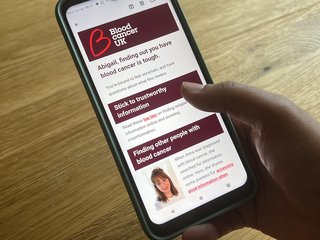Just diagnosed: your risk of infection
If you have a blood cancer diagnosis, you may have a higher risk of getting an infection and becoming more ill from it than normal.
Blood cancer and your risk of infection
Blood cancer often affects your immune system – the network of blood cells and organs that protect your body from infections caused by bugs such as bacteria and viruses. If your immune system is weakened, you’ll be more likely to pick up infections and your body will find it harder to fight them off.
Some treatments for blood cancer (especially chemotherapy) temporarily weaken the immune system even further.
It's very important to take care of yourself and try to avoid infections as best you can. Speak to your hospital team or GP about this. Or contact our Support Service on 0808 2080 888 or [email protected] for more information and to talk about your concerns.
Symptoms of infection
If you think you have symptoms of an infection, you should contact your hospital team or GP straight away. Symptoms include:
- feeling hot or cold (a temperature that’s higher or lower than normal)
- sore throat
- cough producing green mucus
- frequent watery poos (diarrhoea)
- being sick (vomiting)
- feeling dizzy or faint
- headache or stiff neck
- skin feeling red, hot or swollen
- burning or stinging when you wee or passing a small amount
- pain, redness or discharge (fluid) around the site of a central line
- pain, itching or unusual discharge from your penis or vagina
- new pain anywhere in your body
- generally not feeling well.
Read our information about the symptoms of infection and what to do if you have any.
Or watch and share our short video:
How to help prevent infection
- clean your hands frequently with water and soap or hand sanitiser
- avoid touching your face with your hands
- make sure your food is stored and cooked properly (the Food Standards Agency has advice on this)
- avoid people who have infections or are sick
- avoid crowded places like public transport, festivals and shopping centres.
You may be offered drugs or vaccinations which can stop you getting infections like flu or pneumonia (a serious chest infection). Ask your medical team or GP for advice.
We have more information about ways to avoid infection.
Am I at risk from covid?
Because blood cancer affects the immune system, many people with blood cancer are considered ‘clinically extremely vulnerable’ to covid-19, whether or not they’re having treatment. So you may have a higher risk of getting coronavirus and getting seriously ill from it, even if you're vaccinated.
You may find it useful to read our information on coping with risk and uncertainty. We also have general guidance on how to protect yourself from covid and other infections. But as everyone’s situation is different, you should always speak to your hospital team. They are the best people to advise you about your level of risk and what you need to do to stay safe.
If you think you have covid
If you have a blood cancer diagnosis, you may be eligible for treatment if you get covid. Read our information about antiviral or antibody treatments and how to access them where you live.
You can also still get free lateral flow tests from some pharmacies, so make sure you keep a box at home.

Get a weekly support email from us
We'll send you clear and simple information, practical tips, and advice from other people with blood cancer, to help during the first few weeks and months after diagnosis.
